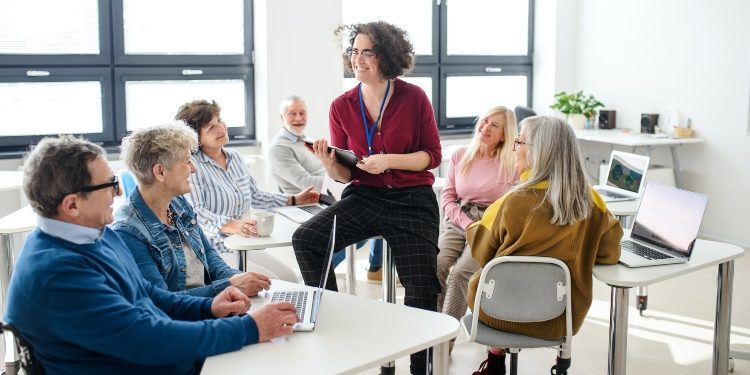Teacher workshops aim to provide quality professional development, collaboration, and rejuvenation for educators. But how can organizers design and facilitate truly engaging, effective on-site training workshops that ignite excitement and deliver lasting classroom impact?
The most successful workshops keep teachers actively learning, reflecting, and applying the material to their classrooms. Avoiding a passive lecture model, great workshops emphasize interaction, relevance, differentiation, and teacher choice.
Here are 5 key strategies to create immersive workshops that equip teachers to bring fresh, innovative approaches back to their students:
Promote Active Collaboration & Sharing
Collaboration should be at the core of any high-quality teacher workshop. Skillful facilitators build in ample small and large group work to tap into educators’ experience and promote sharing diverse perspectives.
Effective techniques include think-pair-share activities, roleplaying scenarios, peer feedback on ideas, group case analysis and problem-solving, and jigsaw style coaching. Be sure to leave time for open dialogue and relationship building as well. Guiding teachers to learn together, rather than alone, leads to deeper insights and ability to collaboratively troubleshoot implementation challenges.
Make it Hands-On & Practical
Quality workshops move far beyond excessive lecture-based delivery. Teachers need authentic, hands-on practice applying workshop content to build comfort and confidence implementing the strategies with their students.
Incorporate highly interactive exercises like analyzing real student work samples, exploring new ed tech tools through creation projects, developing sample lessons or assessments, deconstructing case studies, and rehearsing skills through role play. Ensure teachers leave not just inspired, but ready to practically apply the learning in their classrooms.
Offer Differentiation & Customization
Effective professional development takes into account teachers’ different backgrounds, experience levels, and needs. While having a consistent overarching theme, build in personalization options like varied breakout topics, open studio time, “master classes” on specific skills, and flexible coaching conversations.
Teachers should leave with differentiated next steps and specific, personalized plans for implementation. Using pre-workshop surveys and facilitating group discussion can help design workshop components that best meet participants’ interests and goals.
Keep it Highly Engaging & Inspiring
Sustain energy and enthusiasm over the course of a workshop by incorporating varied delivery methods like storytelling, lively debates, hands-on games, interactive art, and music. Bring in passionate guest speakers from diverse backgrounds to get new perspectives. Use visuals, multimedia, and technology to anchor learning and capitalize on different learning styles.
Schedule in frequent group movement breaks as well. While serious, workshop content should spark creativity, passion, and purpose. Facilitating high engagement enhances learning, comprehension, and motivation to put strategies into practice.
Evaluate Impact & Seek Feedback
Continuously gather teacher feedback during and after workshops and evaluate long-term impact. Ask attendees how they’ve since applied the learning and improved their day-to-day practice. Notice what follow-up support may be helpful for ongoing success.
Adjust future workshop content based on insights into what strategies worked exceptionally well—and what didn’t land or meet teacher needs. The goal is maximum, lasting benefit to classrooms. Examining impact ensures your workshops hit the mark.
Additional Best Practices
- Beyond these core strategies, stellar workshops often incorporate:
- Immersive real world simulations to spur critical thinking and perspective taking.
- Reflection prompts and protocol to cement metacognition and commitment to action steps.
- Exploration of timely issues and challenges faced in education.
- Intentional relationship building and networking opportunities.
- Ongoing support systems, coaching, and follow-through long after the workshop ends.
- Passionate, inspiring facilitators who model the techniques and approaches firsthand.
Conclusion
Of course, impact also depends on school leadership fostering a culture that empowers teachers to be lifelong learners and try new approaches after workshops conclude. Teachers need authentic support and permission to innovate.
But thoughtfully designed workshops ignite excitement, deepen learning, equip teachers to meet all students’ needs, and drive change. Following strong models and intentionally facilitating engagement, choice, application, inspiration, and ongoing support will ensure your workshops deliver maximum, lasting gains for educators and classrooms alike. Make your next workshop transformative by incorporating these key strategies for active learning and lasting impact.
David Prior
David Prior is the editor of Today News, responsible for the overall editorial strategy. He is an NCTJ-qualified journalist with over 20 years’ experience, and is also editor of the award-winning hyperlocal news title Altrincham Today. His LinkedIn profile is here.


![7 Best POS Software in the UK [2026 Edition]](https://todaynews.co.uk/wp-content/uploads/2026/02/7-Best-POS-Software-in-the-UK-2026-Edition-360x180.png)










































































